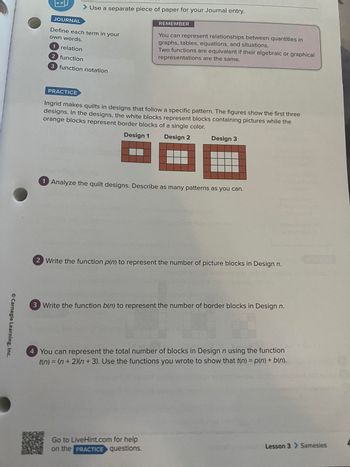
Algebra and Trigonometry (6th Edition)
6th Edition
ISBN: 9780134463216
Author: Robert F. Blitzer
Publisher: PEARSON
expand_more
expand_more
format_list_bulleted
Question

Transcribed Image Text:Carnegie Learning, Inc.
JOURNAL
Use a separate piece of paper for your Journal entry.
Define each term in your
own words.
1 relation
2 function
3 function notation
PRACTICE
REMEMBER
You can represent relationships between quantities in
graphs, tables, equations, and situations.
Two functions are equivalent if their algebraic or graphical
representations are the same.
Ingrid makes quilts in designs that follow a specific pattern. The figures show the first three
designs. In the designs, the white blocks represent blocks containing pictures while the
orange blocks represent border blocks of a single color.
Design 1
Design 2
Design 3
1 Analyze the quilt designs. Describe as many patterns as you can.
2 Write the function p(n) to represent the number of picture blocks in Design n.
Go to LiveHint.com for help
on the PRACTICE questions.
3 Write the function b(n) to represent the number of border blocks in Design n.
4 You can represent the total number of blocks in Design n using the function
t(n) = (n + 2)(n+3). Use the functions you wrote to show that t(n) = p(n) + b(n).
Lesson 3 > Samesies
Expert Solution
This question has been solved!
Explore an expertly crafted, step-by-step solution for a thorough understanding of key concepts.
This is a popular solution
Trending nowThis is a popular solution!
Step by stepSolved in 6 steps with 1 images

Knowledge Booster
Similar questions
- Help with all please.arrow_forwardUse the following graph to illustrate the relationship between the cost per bag of potato chips and the quantity of potato chips produced if it has a minimum point at $4 a bag and 4 bags. Put a point to show the minimum point Screenshot attached below thanks just graph what the question is askingarrow_forward4. Write the equation that creates the following table values. State the parent function.( Parent function key points (0,0) (4,2) (9,3) Transformed key points (6,5) (4,3) (1.5,-2)arrow_forward
arrow_back_ios
arrow_forward_ios
Recommended textbooks for you
 Algebra and Trigonometry (6th Edition)AlgebraISBN:9780134463216Author:Robert F. BlitzerPublisher:PEARSON
Algebra and Trigonometry (6th Edition)AlgebraISBN:9780134463216Author:Robert F. BlitzerPublisher:PEARSON Contemporary Abstract AlgebraAlgebraISBN:9781305657960Author:Joseph GallianPublisher:Cengage Learning
Contemporary Abstract AlgebraAlgebraISBN:9781305657960Author:Joseph GallianPublisher:Cengage Learning Linear Algebra: A Modern IntroductionAlgebraISBN:9781285463247Author:David PoolePublisher:Cengage Learning
Linear Algebra: A Modern IntroductionAlgebraISBN:9781285463247Author:David PoolePublisher:Cengage Learning Algebra And Trigonometry (11th Edition)AlgebraISBN:9780135163078Author:Michael SullivanPublisher:PEARSON
Algebra And Trigonometry (11th Edition)AlgebraISBN:9780135163078Author:Michael SullivanPublisher:PEARSON Introduction to Linear Algebra, Fifth EditionAlgebraISBN:9780980232776Author:Gilbert StrangPublisher:Wellesley-Cambridge Press
Introduction to Linear Algebra, Fifth EditionAlgebraISBN:9780980232776Author:Gilbert StrangPublisher:Wellesley-Cambridge Press College Algebra (Collegiate Math)AlgebraISBN:9780077836344Author:Julie Miller, Donna GerkenPublisher:McGraw-Hill Education
College Algebra (Collegiate Math)AlgebraISBN:9780077836344Author:Julie Miller, Donna GerkenPublisher:McGraw-Hill Education

Algebra and Trigonometry (6th Edition)
Algebra
ISBN:9780134463216
Author:Robert F. Blitzer
Publisher:PEARSON

Contemporary Abstract Algebra
Algebra
ISBN:9781305657960
Author:Joseph Gallian
Publisher:Cengage Learning

Linear Algebra: A Modern Introduction
Algebra
ISBN:9781285463247
Author:David Poole
Publisher:Cengage Learning

Algebra And Trigonometry (11th Edition)
Algebra
ISBN:9780135163078
Author:Michael Sullivan
Publisher:PEARSON

Introduction to Linear Algebra, Fifth Edition
Algebra
ISBN:9780980232776
Author:Gilbert Strang
Publisher:Wellesley-Cambridge Press

College Algebra (Collegiate Math)
Algebra
ISBN:9780077836344
Author:Julie Miller, Donna Gerken
Publisher:McGraw-Hill Education